|
|
|
Sort Order |
|
|
|
Items / Page
|
|
|
|
|
|
|
| Srl | Item |
| 1 |
ID:
166352
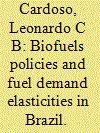

|
|
|
|
|
| Summary/Abstract |
Biofuels are often seen by policymakers as solutions to concerns about the environment, energy diversification, and rural development. To understand the impacts of biofuel policy, however, it is important to understand demand elasticities. Brazil, a leader in biofuels, provides a unique setting to increase our knowledge about biofuel policy and the interactions within and between the gasoline and ethanol markets. We estimate own-price, cross-price, and income elasticities of the demand for ethanol and gasoline using a novel instrumental variable approach to control for the inherent endogeneity between supply and demand. This results in own-price elasticities for both fuels higher than previous literature suggests: approximately − 0.9 for gasoline and − 1.5 for ethanol. Income elasticities for both fuels are approximately 0.8. We also examine the elasticity impacts following the introduction of flex-fuel cars into the Brazilian market. By estimating the model with over 100 subsamples across time, we find that cross-price elasticities become positive, significant, and increasing, but only after larger market penetration of flex-fuel cars, which occurred approximately three years after their introduction.
|
|
|
|
|
|
|
|
|
|
|
|
|
|
|
|
| 2 |
ID:
117077
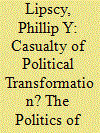

|
|
|
|
|
| Publication |
2012.
|
| Summary/Abstract |
The Democratic Party of Japan (DPJ) came to power in 2009 promising significant transportation sector reform, but it has struggled to implement its proposals. I argue that the DPJ's initiatives faltered due to the legacy of "efficiency clientelism." Historically, Japanese transportation policy combined two imperatives: (1) encourage efficiency by raising the cost of energy-inefficient transportation, and (2) redistribute benefits to supporters of the incumbent Liberal Democratic Party (LDP). Because of the legacy of efficiency clientelism, DPJ campaign pledges-designed to appeal broadly to the general public by reducing transportation costs- ran up against the prospect of sharp declines in revenues and energy efficiency. Efficiency clientelism was well suited to political realities in Japan prior to the 1990s, but recent developments have undercut its viability. This raises profound questions about the sustainability of Japan's energy efficiency achievements.
|
|
|
|
|
|
|
|
|
|
|
|
|
|
|
|
| 3 |
ID:
110368
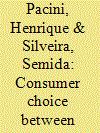

|
|
|
|
|
| Publication |
2011.
|
| Summary/Abstract |
The introduction of flex-fuel vehicles since 2003 has made possible for Brazilian drivers to choose between high ethanol blends or gasoline depending on relative prices and fuel economies. In Sweden, flex-fuel fleets were introduced in 2005. Prices and demand data were examined for both Brazil and Sweden. Bioethanol has been generally the most cost-efficient fuel in Brazil, but not for all states. In any case, consumers in Brazil have opted for ethanol even when this was not the optimal economic choice. In Sweden, a different behavior was observed when falling gasoline prices made E85 uneconomical in late 2008. In a context of international biofuels expansion, the example of E85 in Sweden indicates that new markets could experience different consumer behavior than Brazil: demand falls rapidly with reduced price differences between ethanol and gasoline. At the same time, rising ethanol demand and lack of an international market with multiple biofuel producers could lead to higher domestic prices in Brazil. Once the limit curve is crossed, the consumer might react by shifting back to the usage of gasoline.
|
|
|
|
|
|
|
|
|
|
|
|
|
|
|
|
| 4 |
ID:
171369
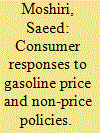

|
|
|
|
|
| Summary/Abstract |
Gasoline consumption in emerging economies have been rising rapidly due to economic growth and increasing urbanization rate in recent years. However, the development has brought about new socio-economic and environmental challenges leading governments to adopt various policies to control the trend. Although the impacts of price changes on gasoline consumption are well-researched in the literature, studies on different policies in a specific country is limited. In this paper, we investigate the impact of three distinct policies (price reform, rationing, and fuel-efficiency) on consumer responses in Iran. We estimate price, income, and efficiency elasticities across household characteristics, income groups, and provinces using the AIDS model and the household expenditures data for the period 2005–2016. The results show that the average price elasticity is -76, however, it varies across household characteristics, time, and space. The price responses are greater in provinces neighbouring the countries with high price differentials and welfare losses of price reform are more sever for lower income families. The estimated elasticities under different policy regimes show that energy price reform has led to significantly higher elasticities, while rationing has led to decreased elasticities. The more stringent efficiency regulation and increasing imports of fuel-efficient cars have also increased elasticities.
|
|
|
|
|
|
|
|
|
|
|
|
|
|
|
|
| 5 |
ID:
133101
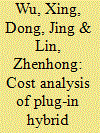

|
|
|
|
|
| Publication |
2014.
|
| Summary/Abstract |
Using spatial, longitudinal travel data of 415 vehicles over 3-18 months in the Seattle metropolitan area, this paper estimates the operating costs of plug-in hybrid electric vehicles (PHEVs) of various electric ranges (10, 20, 30, and 40 miles) for 3, 5, and 10 years of payback period, considering different charging infrastructure deployment levels and gasoline prices. Some key findings were made. (1) PHEVs could help save around 60% or 40% in energy costs, compared with conventional gasoline vehicles (CGVs) or hybrid electric vehicles (HEVs), respectively. However, for motorists whose daily vehicle miles traveled (DVMT) is significant, HEVs may be even a better choice than PHEV40s, particularly in areas that lack a public charging infrastructure. (2) The incremental battery cost of large-battery PHEVs is difficult to justify based on the incremental savings of PHEVs' operating costs unless a subsidy is offered for large-battery PHEVs. (3) When the price of gasoline increases from $4/gallon to $5/gallon, the number of drivers who benefit from a larger battery increases significantly. (4) Although quick chargers can reduce charging time, they contribute little to energy cost savings for PHEVs, as opposed to Level-II chargers.
|
|
|
|
|
|
|
|
|
|
|
|
|
|
|
|
| 6 |
ID:
133227
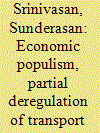

|
|
|
|
|
| Publication |
2014.
|
| Summary/Abstract |
The Indian political class is known to employ populist, albeit economically unsustainable, measures to replace intrinsic 'valence', especially shortly prior to election windows. Such measures include loan-waivers, interest rate concessions, provision of free electricity for agriculturists, etc. The union government's leverage to maneuver and to micro-manage retail fuel prices within partially deregulated environments is hypothesized to provide incumbents with an advantage over rival contestants in the electoral process. This paper analyzes the evolution in the retail prices of diesel and petrol (gasoline), and the transfer of such evolution, into the inflation index of the 'all commodity' basket. It is observed that when international benchmark prices are relatively low and domestic inflation is moderate, the transfer occurs within about 42 weeks. During periods of high oil prices-frequently above USD 100 a barrel-and high inflation-higher than 5.00-5.50%-prices of petroleum distillates tend to feed into overall inflation more rapidly, within about 34-40 weeks.
The study, covering a total of 82 elections for the central and state (provincial) governments during the period 2000 to 2013, concludes that even as patterns of manipulation of prices are apparent, ceteris paribus, such leverage does not necessarily seem to translate into favorable electoral outcomes. This conclusion reiterates observations that economic im/prudence may not necessarily determine electoral outcomes, and that the basis for electoral choices made by the Indian voter-consumer remains subjective.
|
|
|
|
|
|
|
|
|
|
|
|
|
|
|
|
| 7 |
ID:
176099
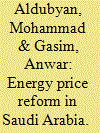

|
|
|
|
|
| Summary/Abstract |
Saudi Arabia has regulated domestic energy prices for decades, setting them below international market levels. Energy subsidies in Saudi Arabia are generally implicit because they lead to foregone revenues for the government. Low energy prices also encourage rapid energy demand growth and wasteful consumption, while limiting incentives to invest in energy efficiency. Saudi Arabia recently started to reform energy prices, leading to large increases in gasoline and residential electricity prices in 2018. To measure the economic and environmental impacts of energy price reform, we econometrically model gasoline and residential electricity demand using Harvey's (1990) Structural Time Series Model. Our estimated equations reveal that gasoline demand and residential electricity demand in Saudi Arabia are strongly price and income inelastic, despite the major reforms that were recently implemented. Our welfare analysis also shows that the energy price reforms in 2018 in gasoline and residential electricity respectively delivered welfare gains of 8.8 and 3.8 billion SAR annually (2.3 and 1.0 billion US$). Additionally, our decomposition analysis reveals that these energy price reforms were the largest contributors to the observed decreases in gasoline and residential electricity consumption in 2018.
|
|
|
|
|
|
|
|
|
|
|
|
|
|
|
|
| 8 |
ID:
166477


|
|
|
|
|
| Summary/Abstract |
The transportation sector is one of the sustainable development wheels that requires a lot of energy to operate, therefore it is concerned as one of the main factors in greenhouse gas emissions and global warming. In Iran, like rest of the world, the light-duty vehicles are the effective factors in the pollution of the metropolitan cities. Although the management of their fuel consumption is a vital action in decreasing the cost and air pollution, that's inextricable link with the public welfare and the economy of the car manufacturers creates barriers. An accurate analysis concerning the barriers to reducing the fuel consumption can be obtained by using the game theory method in the light-duty vehicles. For this purpose, the effective factors including the people, car manufacturer and government are modeled and their utility are considered. By examining the relationships among the players and their actions we can conclude that the penalty option can significantly help the management of the fuel consumption. Also, forcing the government to lend to the car manufacturer to improve the fuel consumption of motor vehicles reduces fuel consumption. In addition, standard setting for the average fuel consumption of the producing cars should be staged and stepped.
|
|
|
|
|
|
|
|
|
|
|
|
|
|
|
|
| 9 |
ID:
127178
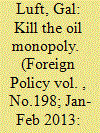

|
|
|
| 10 |
ID:
111310
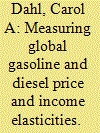

|
|
|
|
|
| Publication |
2012.
|
| Summary/Abstract |
Price and income elasticities of transport fuel demand have numerous applications. They help forecast increases in fuel consumption as countries get richer, they help develop appropriate tax policies to curtail consumption, help determine how the transport fuel mix might evolve, and show the price response to a fuel disruption. Given their usefulness, it is understandable why hundreds of studies have focused on measuring such elasticities for gasoline and diesel fuel consumption. In this paper, I focus my attention on price and income elasticities in the existing studies to see what can be learned from them. I summarize the elasticities from these historical studies. I use statistical analysis to investigate whether income and price elasticities seem to be constant across countries with different incomes and prices. Although income and price elasticities for gasoline and diesel fuel are not found to be the same at high and low incomes and at high and low prices, patterns emerge that allow me to develop suggested price and income elasticities for gasoline and diesel demand for over one hundred countries. I adjust these elasticities for recent fuel mix policies, and suggest an agenda of future research topics.
|
|
|
|
|
|
|
|
|
|
|
|
|
|
|
|
| 11 |
ID:
132650


|
|
|
|
|
| Publication |
2014.
|
| Summary/Abstract |
The world×s most expensive motor fuel (gasoline, diesel and LPG) is sold most likely in the Republic of Turkey. This paper investigates the key issues related to the motor fuel prices in Turkey. First of all, the paper analyses the main reason behind high prices, namely motor fuel taxes in Turkey. Then, it estimates the elasticity of motor fuel demand in Turkey using an econometric analysis. The findings indicate that motor fuel demand in Turkey is quite inelastic and, therefore, not responsive to price increases caused by an increase in either pre-tax prices or taxes. Therefore, fuel market in Turkey is open to opportunistic behavior by firms (through excessive profits) and the government (through excessive taxes). Besides, the paper focuses on the impact of high motor fuel prices on road transport associated activities, including the pattern of passenger transportation, motorization rate, fuel use, total kilometers traveled and CO2 emissions from road transportation. The impact of motor fuel prices on income distribution in Turkey and Turkish public opinion about high motor fuel prices are also among the subjects investigated in the course of the study.
|
|
|
|
|
|
|
|
|
|
|
|
|
|
|
|
| 12 |
ID:
125814
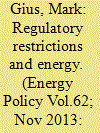

|
|
|
|
|
| Publication |
2013.
|
| Summary/Abstract |
The purpose of the present study is to estimate the effects of the Jones Act on spot gasoline prices. Although the Jones Act pertains to the domestic shipment of all types of goods, the present study will only focus on gasoline. The present study will use data obtained from the Energy Information Administration in order to determine if the price of gasoline declined during Jones Act waiver periods. Looking at daily prices, the results regarding the effects of the Jones Act on spot gasoline prices are mixed. When using a t-test, the results indicated either that there was no significant difference or that prices were actually higher during the waiver periods. When using a first-order autoregressive model, it was found that prices were lower during the 2005 waiver period but higher during the 2012 waiver. Given these inconclusive results, it is not possible to conclude that the Jones Act restrictions contribute to higher gasoline prices.
|
|
|
|
|
|
|
|
|
|
|
|
|
|
|
|
|
|
|
|
|